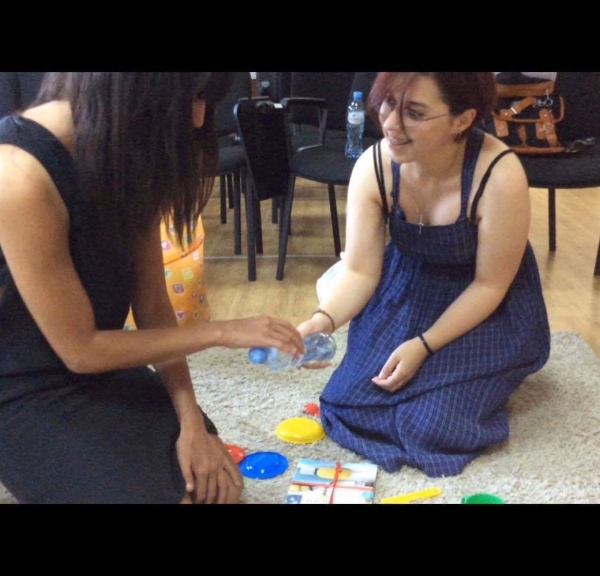Nino Margvelashvili is a neuropsychologist, based in Tbilisi with a vision to scale up ICDP in the future.
Nino works with children with special needs in an international school, as well as doing assessments and rehabilitation courses concerning different disorders, including epilepsy, specific learning disorder, ADHD and other. On behalf of the Ministry of Education and Science she has been working as a trainer for teachers in different regions of Georgia, covering various aspects of inclusion and specific strategies on how to help students in school.
During July and August 2017, she carried out an ICDP pilot project for parents at the Institute of Neurology and Neuropsychology in Tbilisi and soon after that, in early October, she went to London to attend ICDP training by Nicoletta Armstrong..
Nino intends to start training her colleagues and hopes to encourage other organizations in her country to embrace ICDP – she explains:
“I am keenly interested in collaborating with ICDP. I have two children, my work experience is largely connected to children and I can often notice pitfalls in parents’ existing skill repertoire when interacting with children and dealing with challenging situations. During my studies in Oslo (2010-2012) I was fascinated by the importance and simplicity of positive interaction and the ICDP themes. My thesis was about ICDP, positive interaction between teacher and students of different abilities.
I believe ICDP will give a unique experience and provide skills to parents, focusing on their engagement and personal experience. More than that, in ICDP everything is done through love and acceptance of the caregiver and from my point of view this point makes the whole process worthy and valuable. My long term goal is organizing community based ICDP training in order to empower parents in many different parts of Georgia.
In the report by UNICEF and USAID called “Violence against children in Georgia” there is a section referring to the survey “National Survey about Knowledge, Attitudes and Practices”, which states that:
45% of the Georgian population accepts and regards physical violence and punishment as a discipline against “spoiling” kids.
30% of women and 17% of men said yes when asked if they use physical punishment
60% of population thinks that using punishment methods in children upbringing are more effective than using non-violent methods
Society does not know much about the meaning of psychological violence
Children’s interests are ignored – parents or caregivers deprive children’s physical or emotional needs despite having relevant possibilities, knowledge and access to services.
30% said that their parents used physical violence in their childhood.
14-18 year old youngsters think that the possible abuser of child mostly is a parent.
Society thinks that in-family violence against children is family’s business and are against intervention
However, 82% of Georgian population states that violence is a problem that should be ended This shows that there is a will to overcome this problem in Georgia.
Based on the above data UNICEF made several recommendations to the Georgian government and NGOs, and one of them is to launch special programmes and campaigns to make parents use non-violent discipline, encourage positive parenting and introduce alternative methods to physical disciplining; to raise awareness of parents to develop children’s potential. In line with this, I would like to spread ICDP to parents nation-wide. I feel strongly that it is time to try to change the basis of parenting for children’s happier and healthier future. “
***
Comments from participants of ICDP training at the Institute of Neurology and Neuropsychology in Tbilisi:
My child and I became more engaged in our shared activities; communication is now easier and more interesting for both of us.
Our relationships in the family became more peaceful and balanced; we started to find common ground for problem solving and consequently we now dialogue with each other more.
I became more confident, more aware and mindful, paying more attention to each word and gesture. Thank you.
It’s very important to use the guidelines. I will use it more in my life.
I discovered that we are different from our parents’ generation; we express more love, through close dialogue with children.
I follow my child’s initiative, I discovered that I can do it and that it is important – I should not be the leader but follow the child.
I now know how to regulate behaviour through explanations, giving alternatives.
I understand how important it is to pay attention and show love, have close dialogue and not to be afraid to express love and emotions.
I loved role play, analyzing videos and photos.
I discovered how much meaning I can provide to my child through explanations of everyday objects – my interactions can become more educational and I can increase my own knowledge by guiding my child.
I have to work on how to console my child. I realized the importance of non-verbal ways of showing love and that details are important.
(Photos above and below are from the ICDP training)


